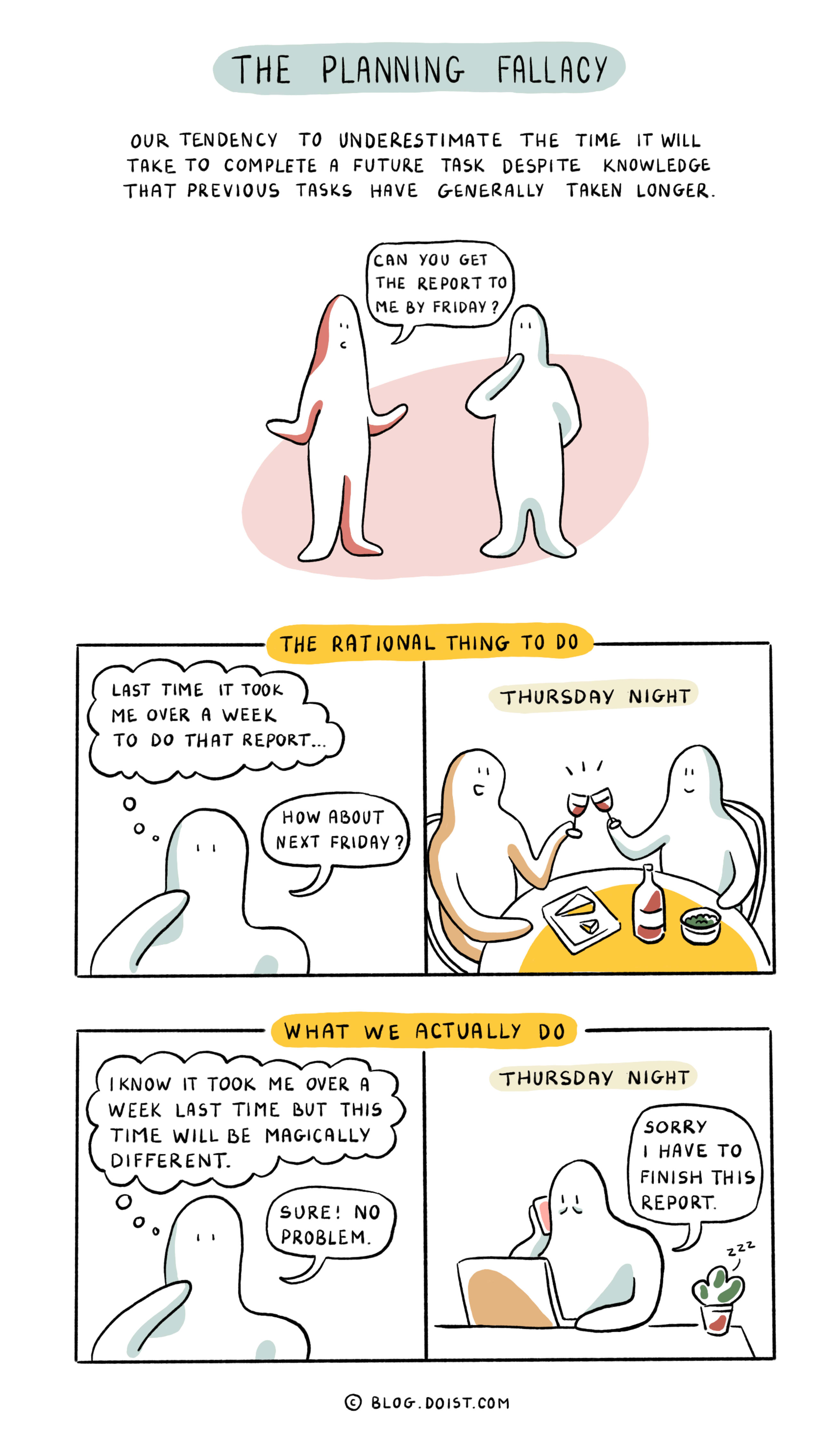
The next time your boss asks why you missed a deadline, blame it on your brain.
The Planning Fallacy refers to our tendency to underestimate the time it will take to complete a future task despite knowing that similar tasks have taken longer in the past. Contractors underestimate how much time renovations will take. Writers underestimate the amount of time they’ll need to complete a novel. Product managers underestimate how long a new feature will take to build. Elon Musk misses Tesla production timeline after Tesla production timeline. (When asked about his penchant for giving wildly inaccurate predictions, Musk replied "People should not ascribe to malice that which can easily be explained by stupidity.”)
Worse still, multiple studies show that we underestimate timelines even when we know we’re likely to underestimate timelines.
The Planning Fallacy can be a great thing. How many projects would we never have taken on if we had an accurate understanding of how much work and time would be required at the start? Sometimes, ignorance is bliss. But most of the time, committing to overly optimistic deadlines just leads to a lot of unnecessary stress and guilt.
We can’t meet deadlines, but we can’t get anything done without them (see the Mere Urgency Effect), so how do we learn to live with them?
What you can do about it:
Break projects down into smaller parts and estimate how long each will take. The more granular you can be in your project planning, the more realistic your time estimates tend to be. It’s easy for me to say, “Sure, I can absolutely get that draft to you in 2 days”, but when I break down how many words per hour that would require, it becomes obviously unrealistic.
Pad your schedules more than you think you need to. Whatever you think is a reasonable project timeline, pad the schedule with 20%. As you’re planning your week, pretend Friday (20% of the work week) doesn’t exist. If you get to Friday with everything complete, great! You can spend that time learning or working on a side project or getting ahead on the next thing. But more likely than not, the work you planned for four days will end up spilling over into the fifth. It’s better to plan for it than be surprised by it.
Use historical data to make better predictions. Start tracking the time it takes you to actually complete things, and use that historical data to make more accurate predictions. Don't fool yourself into thinking you’ll be able to finish it faster next time. Use a time tracking tool like Toggl that integrates with several task managers, including Todoist, so you can start your timer right from your task lists.
Limit the scope of work. At Doist, we work in four-week project cycles. While we’ve gotten better at planning our work over the years, projects can still fall behind. Instead of extending the timeline, our project squads have started reducing the scope of work mid-cycle. This way, even when we fall victim to the Planning Fallacy, our squads still ship high-quality work that will deliver value for Todoist and Twist users, even if it means leaving off some things for a later version.
When you’re going to miss a deadline, communicate that early and often. No matter how careful you are, you will inevitably find yourself with a looming deadline and no chance of meeting it. If you’re anything like me, your first instinct will be to stick your head in the sand and avoid thinking about it (see “Present Bias” below). But that just makes everything worse. The earlier you can let people know, the better they’ll be able to adjust their own plans. Most people are understanding. Even when they’re not, they’ll be a whole lot more understanding than if you told them you’d be missing a deadline after the fact.
More reading if you're interested:
Quantify Yourself: (Mostly) Free Tools & Strategies to Track (Almost) Every Area of Your Life
Comic artwork by Anaïs Pirlot-Mares 🎨 Written by Becky Kane ✏️
